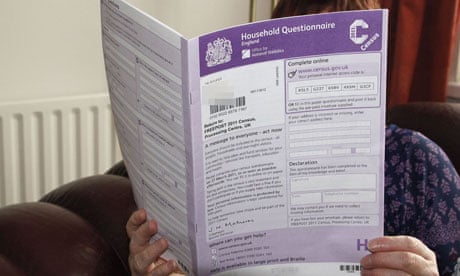The government's prosecution of census objectors is in jeopardy after a Birmingham man was granted a judicial review to challenge the legality of the act that makes it an offence not to complete the 10-yearly survey.
Privacy campaigner Nigel Simons, who did not fill out the census, argues that section 8 of the 1920 Census Act conflicts with his right to privacy guaranteed by the European Convention on Human Rights.
The granting of a judicial review comes days after two census objectors saw their prosecutions unexpectedly dropped by the Crown Prosecution Service. One of them, John Marjoram, who is mayor of the Cotswolds town of Stroud, said he thought the CPS had dropped his case rather than face the prospect of having the issues around privacy aired in a public trial.
"Given the pervasive culture of citizen surveillance and the erosion of individual liberties pursued by recent governments, it is no surprise to me that the CPS preferred to keep these issues under wraps." he said.
The judicial review at the high court next month will be an embarrassment for the Office of National Statistics, the government body that runs the census, and the CPS. To date, the CPS has prosecuted 252 people for failing to complete the census.
Of those, 198 have been given fines of up to £1,000, while 55 have filled out the form. Should the judicial review be successful, those convictions could be appealed.
Objections over the 2011 census focus on three issues: the perceived intrusiveness of some questions, the lack of safeguards to protect data gathered for the census, and the role of the UK subsidiary of the US defence contractor Lockheed Martin in processing census data.
Lockheed Martin insists that "no Lockheed Martin employee has access to the data". However, objectors fear that once the census data has been processed by the company it will be vulnerable to seizure by the American government. The US Patriot Act compels US companies operating in the States or overseas to hand over any information that is required. One scenario is that the US government takes the information without informing British authorities.
Another company awarded one of the lucrative census contracts, UK Data Capture, is jointly owned by the US company Vangent, which is in turn part of the US defence giant General Dynamics Information Technology. Earlier this year GDIT won a £30m Department of Health contract.
"The legal case is of fundamental importance," said Tony Muman, the barrister who represented Marjoram and John Voysey, a Quaker and pensioner whose case was also unexpectedly dropped by the CPS.
"The government is awarding more and more contracts to companies like Lockheed Martin. The question of the security of the data of UK citizens is of the utmost importance. It's not just about two naughty boys. You can imagine that someone with Marjoram's pedigree and profile might well be of interest to them."
Marjoram, 72, a Green party councillor, Quaker and life-long campaigner against the arms trade, was once imprisoned for trying to plough a US Air Force base in East Anglia to grow crops.
The legal arguments focus on section 39 (4) (f) of the Statistics and Registration Services Act of 2007. The act prohibits the disclosure of personal information gathered for the census. However, section 4 (f) exempts disclosure that is made for criminal proceedings. Critically, the act does not specify whether the proceedings have to be in the UK."Our argument is that the part of the act about data being shared is incompatible with Article 8, "said Birmingham Law Centre's Michael Bates, who is representing Simons. "If that is the case, then the section of the Census Act that compels people to complete the census does so in a way that abuses their Article 8 rights. It is an abuse of process. Therefore anyone that has been convicted has been convicted unlawfully."
Nick Pickles, director of the think-tank Big Brother Watch, demanded that the government come clean about requests for information. "The reach of the Patriot Act extends to the global operations of US companies, so it is imperative the UK government is transparent about any and all the requests to access census data."
Pickles also derided the CPS for dropping the prosecutions. "Having made the decision to prosecute, for the CPS to now bottle it and deny people their day in court is a shameful retreat that illustrates just how absurd the census process has become.
Sam Walton of the census campaign group Count Me Out highlighted one of the potential effects of the judicial review: "The ONS are scared that if they lost this case all government contracts involving the public interacting with arms companies would have to be torn up."
In his legal submissions, Simon points to the recent bid by US defence contractor Kellogg Brown & Root for the £1.5bn contract to run West Midlands and Surrey police. The US company, a former subsidiary of the Halliburton group, built the Guantánamo detention facility in Cuba.
"These cases being dropped shows that there is a strong legal argument to say that conscientious objectors should never have been forced to associate with weapons dealers like Lockheed Martin in the first place," said Walton.
